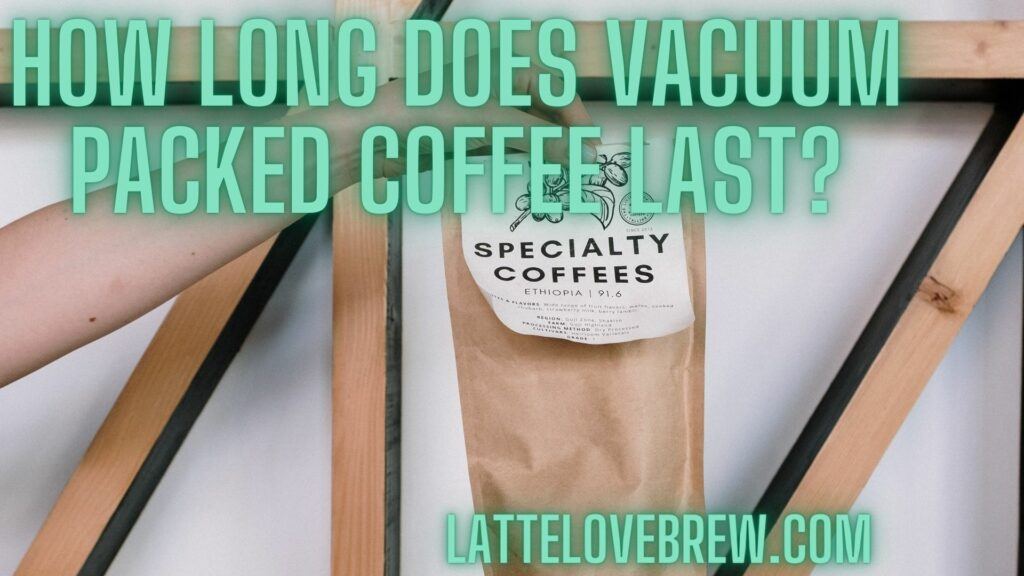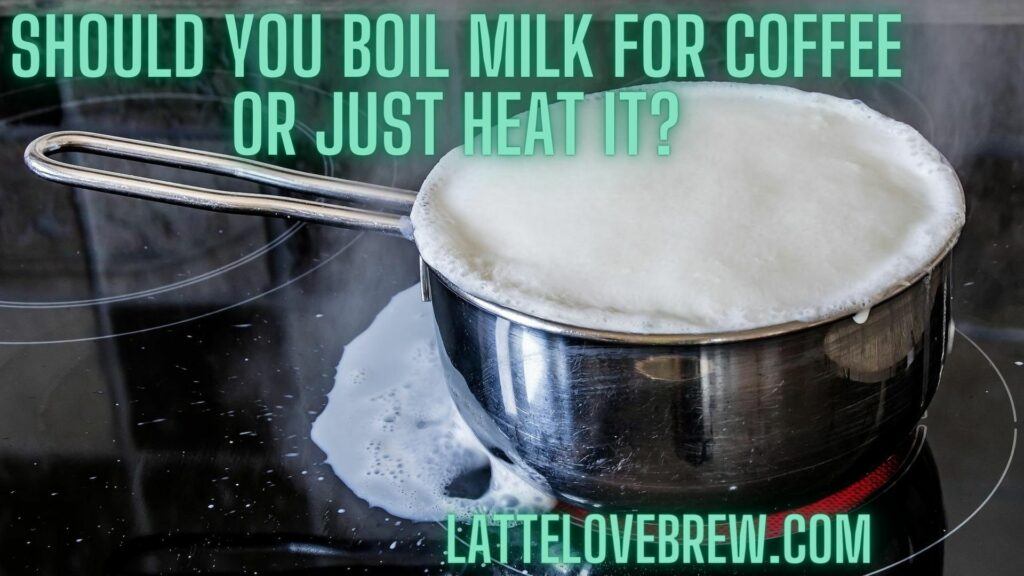Last updated on March 3rd, 2024 at 11:42
One of the most frequently asked questions that I hear relating to coffee storage is how long does vacuum packed coffee last?
The quick and factual answer is 3-5 months for vacuum packed coffee grounds and 6-9 months of vacuum packed coffee grounds.
The better these are stored, the longer they will stay fresh for.
Keep reading as we get down and get detailed and talk about vacuum packed coffee. Keep your eyes open for the section detailing why freezing your coffee is better.
How Long Does Vacuum Packed Coffee Last?
Table Of Contents
- 1 How Long Does Vacuum Packed Coffee Last?
- 2 How Long Does Coffee Last After Roast Date?
- 3 What Is The Best Way To Open A Vacuum Sealed Coffee Bricks?
- 4 Does Vacuum Packed Coffee Beans Effectively Preserve Their Freshness?
- 5 What Causes Your Fresh Roasted Coffee Beans To Degrade?
- 6 Why Freezing Your Beans Is Better Than Vacuum Sealing
- 7 Frequently Asked Questions About How Long Does Vacuum Packed Coffee Last?
- 8 Final Thoughts – How Long Does Vacuum Packed Coffee Last?
I get many questions asking how long does vacuum packed coffee last and this is a commonly occurring question that will continue to be asked, after all nobody likes stale coffee.
Vacuum packed coffee can last as long as 3-5 months. The process of removing the air slows down the oxidation process significantly which helps vacuum-packed coffee grounds to last much longer than grounds that have not been vacuum packed.
Vacuum packed coffee beans are able to last much longer, as long as 6-9 months due to the reduced surface area of whole beans.

Read: How long does ground coffee last unopened?
How Long Does Coffee Last After Roast Date?
Freshly roasted coffee will stay fresh and retain most of its flavor for up to three weeks after roasting.
However,
you need to pay attention and focus on the grade and quality of coffee that you have purchased. Ordinary and every day coffee is good for 2 to 3 weeks post after they have been roasted.
This is assuming you have used no techniques to store them under optimal conditions.
Specialty grade coffee is something you want to pay special attention to due to their premium quality and higher quality of flavor.
The peak flavor window is from three to five days after roasting and for seven to ten days thereafter. This is the short time frame that you have to enjoy your premium and high quality coffee and get the very best tasting cup of coffee from them.
They can last for 2 to 3 weeks after roasting, just you will start to notice a reduced quality and your beans being less fresh.
Note: This time frame for peak freshness is applicable for all coffee beans, regardless of quality. We tend to be more fussy and want the best from the high quality ones and not so fussy with cheap low quality average coffee beans.
What Is The Best Way To Open A Vacuum Sealed Coffee Bricks?
There is no particular or specific way that is better than another of opening and resealing vacuum sealed coffee bricks.
Of course, it is entirely natural and normal to want to open them and reseal the brick. Honestly, there is no point or no advantage gained even when you have a vacuum device to recreate the vacuum.
I’ll get into the details later in this article, but in essence every time your open and reseal it, recreating the vacuum you are replacing and refreshing the air that is the coffee brick and nullifying any benefit gained.
(sure there is some benefit, but it is absolutely minimal).
Keep reading to find out how minimal the benefit is of maintaining the vacuum when opening and resealing, recreating the vacuum is.

Read: How long do coffee beans last sealed?
Does Vacuum Packed Coffee Beans Effectively Preserve Their Freshness?
Yes, if your goal is long term storage then proper and professional vacuum storage alone can help to preserve the freshness of coffee beans and coffee grounds to about a year or two.
Vacuum storage is a great option when controlling temperature and maintaining your beans at a very low temperature is not an option.
If the goal is to preserve your coffee beans for only a few weeks or a couple of months the time, effort and expense of using a vacuum storage is of no great benefit when compared to the ease of using your freezer and storing your coffee beans in a canister to prevent freezer burn.
The Problem With Vacuum Sealing And Storage
The use of a vacuum storage and sealing does not in any way eliminate or reduce the carbon dioxide (CO2) and degassing of your coffee beans. They do not accelerate the out gassing (de gassing) either. The vacuum is not strong enough to remove all the air from around the coffee bean and leaves more air in the bag if the beans have been preground.
They are not even close to removing all the oxygen, which is what causes your beans (or grounds) to degrade through the oxidation process. The air that is left trapped between the beans and grounds is more than enough to cause your coffee to degrade.
Vacuum storage is very good at stalling and delaying the degradation of your coffee bean (or coffee grounds) which is all we can do at best.

Read: Do coffee grounds go bad?
What Causes Your Fresh Roasted Coffee Beans To Degrade?
Then enemy of fresh roasted coffee beans is anything and everything that will cause the flavor to degrade.
Fats and oils (Lipids) will break down to Oligo-fatty acids which breakdown further and become pretty rancid.
Most of the volatile elements de gas (or out gas) from roasted coffee beans and coffee grounds and are lost to the atmosphere that surrounds the coffee beans. Any of the larger carbohydrates that are present do not pleasantly degrade and become simple sugars, they degrade into alcohols and oligosaccharides.
Protein denatures into amino acids and derivatives of amino acids some of which smell like rotten fish!
The factors that are responsible for the degradation of the flavor of coffee are:
- Time.
- Heat.
- Oxygen.
- Moisture.
After your coffee beans have been roasted and the chemical reactions and changes that have been provoked by the roasting process have taken place your coffee beans are cooled down to room temperature.
Over the following few days, typically 3 days to 5 days reactions continue to take place and internal changes to the fresh roasted coffee beans and carbon dioxide gas is given off and out gassed. Some new reactions only start to take place.
This is perfectly normal and natural. This is why coffee does not reach its peak freshness until 3 to 5 days after roasting. It is this resting period of 3 to 5 days that reduced the brightness of a coffee, and it starts to mellow and bring out the caramel flavors.
When you buy freshly roasted coffee beans and keep them in their original packaging, be they vacuum sealed or not, they will continue to develop for a few days to a few weeks after depending on the coffee beans in question.
Then you will notice that you start to get stale coffee and the flavor and aroma degrades after a couple of weeks.
If you were to test your bag of coffee you would discover that there are carbon dioxide levels inside your bag of coffee that are higher than the surrounding atmosphere.
The presence of the carbon dioxide reduces the concentration of oxygen only slightly, only a tiny amount and does help (a very little) to extend the life of your coffee beans (or grounds) by having a reductive effect on the oxidation process as the carbon dioxide displaces oxygen.
But,
you have not prevented any of the chemical reactions that take place in the coffee beans, and you have not reduced the temperature and those reactions will continue at their regular rate.
Why Freezing Your Beans Is Better Than Vacuum Sealing
Let’s say you have a brand-new bag of coffee, made a cup of coffee and then, with you home vacuum sealing device sealed the bag again.
Guess what?
The next time and every time your reopen it air will rush back and refreshes the air around your beans. You have increased the amount of oxygen in the spaces that are around your coffee beans or coffee grounds and then trapped it there when you reseal the coffee bag, even when you use a home vacuum sealing device to seal your bag of coffee.
If you do this daily you will gain only a few minute to an hour to your freshness factor and a lot of money on a device that will only keep your coffee fresher for about an hour at most.
(Not even mentioning the amount of time spent muddling around with the device while your coffee is sitting hot).
If you buy a bag of coffee and store them in a large coffee canister in your freezer and take out what you need for a couple of days to a week and store those beans in a second canister and keep the second coffee canister in your fridge you are on the right track to having a perfect system.
In this case and system you are keeping your beans in an environment in your freezer and slowing down the chemical reactions that are taking place inside your coffee beans to snail’s pace. The oxidation is also slowed down. This helps you to keep your coffee fresher for longer.
You are effectively preserving the freshness of your coffee beans for a much longer period of time and helping yourself to enjoy that peak freshness window for much longer.
If you are planning of storing your coffee long term simply store them in a large coffee canister without opening and reopening many times is the best practice.
If you need to keep your coffee beans ice-cold for your weekly use, use a second coffee canister for those beans and keep that in your freezer alongside the beans you are freezing long term.
Frequently Asked Questions About How Long Does Vacuum Packed Coffee Last?
Can You Drink 2 Year Old Coffee?
Yes, but only if you have stored it well and under optimal conditions. Ground coffee and whole beans will stay fresh for one or two years without any or very minimal degradation of their flavor as long as you keep it stored well.
Always store your coffee in an airtight container, for best results use a coffee canister and store it in your freezer.
Before you brew your cup of coffee examine your 2-year-old coffee for mold spores, rancid or off scents and rub some between your fingers to check for a grit like texture, if you can feel oil, that’s a good sign.
Then proceed to brew a cup of coffee to run a taste test. If you are not enjoying it, throw your cup of coffee down the sink and buy fresh coffee beans.
How Long Can You Keep Unopened Ground Coffee?
How long you can keep unopened ground coffee depends on how well it is stored. Pre-ground coffee when stored in normal conditions and still in the package that it came it can keep well for 3 to 5 months beyond the sell-by date.
If you keep your package of ground coffee in perfect conditions you can extend the life of ground coffee (or whole bean coffee) for a year or two. You must open the package, and store your beloved coffee in coffee canister that has an airtight lid and a one-way valve. Then store your canister in your freezer.
If you keep your ground coffee or whole beans in their bag and then store them in your freezer you risk freezer burn.
How Do You Store Vacuum-Packed Coffee?
While some coffee Aficionados will recommend that you store you vacuum packed coffee in your freezer – and this is a very good storage method.
However,
in my experience you will risk freezer burn and the ability of the packaging to provide resistance against freezer burn depends entirely on the quality of the packaging.
I prefer to open my beans and put them in a professional coffee canister which due to being airtight will protect the coffee from moisture, air and due to being opaque will protect them from harsh lights.
The one-way valve will allow any carbon dioxide that is produced from the de gassing of the beans to be released and at the same time block air from getting in. The freezing temperature will slow the oxidation process down to a snail’s pace and help to extend the life of coffee.
I have gotten into the habit of using two coffee canisters, one in my freezer where the majority of my beans are kept and a second canister where I keep just a day or two’s worth of coffee beans (or grounds) in my fridge. When needed I refill the second coffee canister with beans from the freezer.
The result of this technique is I enjoy every single of cup of coffee brewed, even the very last cup of coffee with peak freshness and taste that is equal to the first cup.
How Do You Keep Coffee Fresh For Years?
The best way to keep your coffee fresh for a year or two is to use a high quality coffee canister to protect your coffee beans (or grounds) from light, heat and moisture. Due to the quality exterior you will also protect the beans (or coffee grounds) from freezer burn.
Then store your coffee canister in your freezer. Even if you have a bag of unopened vacuum-sealed coffee, open it and store your coffee in a coffee canister. This might sound counter productive but you have no guarantee the packaging will protect against freezer burn.
I buy coffee in bulk from time to time and do this. The investment in coffee canister pays off.
Does Coffee Go Out Of Date If Unopened?
Generally speaking a package of ground coffee that has been stored in your pantry should retain their flavor and freshness for 3 to 5 months beyond the sell-by date.
3-5 months is an average for normal conditions. The time frame depends on the environmental conditions of which you have no control over, for example, if you live near the coast or an area with a high humidity levels then the period will reduce to 2-3 months. Similarly, if you live in a zone that its tropical or during the summer months.
Are Mason Jars Good For Storing Coffee?
No, Mason jars fail in a few key aspects to be considered as good for coffee storage. Many mason jars are transparent and offer no protection against strong lights which will degrade your coffee.
Not all mason jars have an airtight lid (most do, but not all). Most importantly, where all mason jars fail, they do not have a one way valve to permit the coffee to de gas and keep oxygen out.
Final Thoughts – How Long Does Vacuum Packed Coffee Last?
If you have read this far you have the answer to how long does vacuum packed coffee last and what you need to do to help prolong the freshness and the life of your coffee beans or coffee grounds.
I’m happy that you have read this article and know where the inherent fault with vacuum sealed coffee is and why you should not keep trying to reseal the bag or recreate the vacuum.
Join our active and informative coffee community on Facebook/Meta and share your delightfully delicious coffee recipes and creations.







